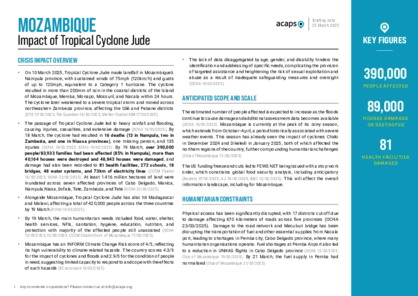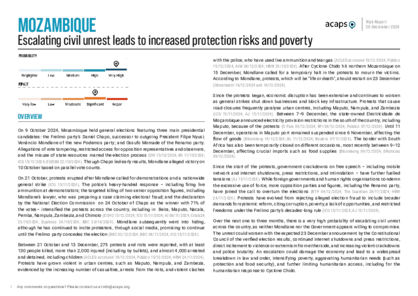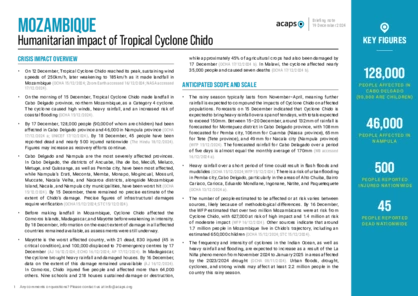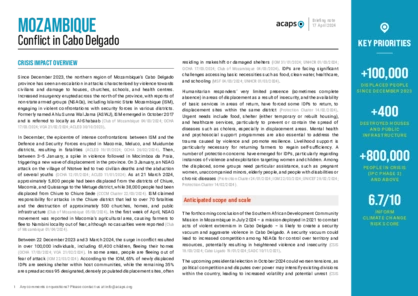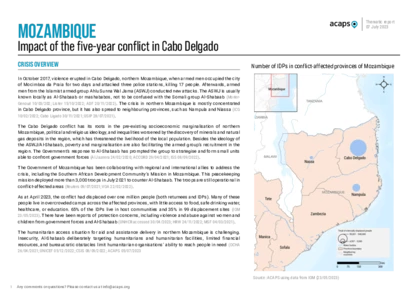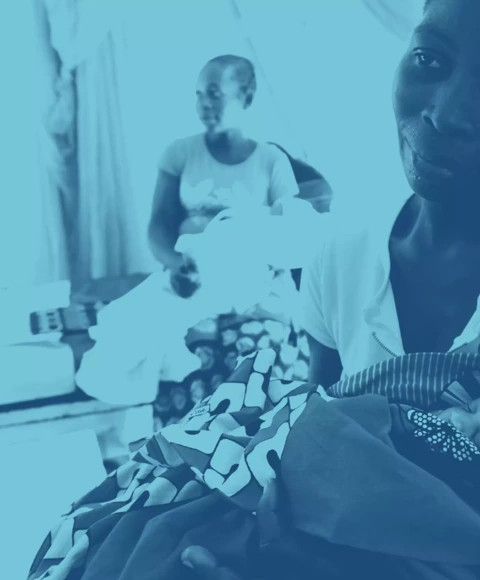Latest updates on country situation
current crises
in
Mozambique
These crises have been identified through the INFORM Severity Index, a tool for measuring and comparing the severity of humanitarian crises globally.
MOZ013 - 2025 Cyclone season
Last updated 31/03/2025
Drivers
Cyclone
Crisis level
Country
Severity level
3.4 High
Access constraints
3.0
MOZ012 - Drought
Last updated 31/03/2025
Drivers
Drought
Crisis level
Country
Severity level
3.3 High
Access constraints
1.0
MOZ001 - Multiple Crises
Last updated 31/03/2025
Drivers
Conflict
Displacement
Cyclone
Drought
Crisis level
Country
Severity level
3.9 High
Access constraints
3.0
MOZ004 - Violent Insurgency in Cabo Delgado
Last updated 31/03/2025
Drivers
Conflict
Displacement
Crisis level
Country
Severity level
3.3 High
Access constraints
3.0
Analysis products
on
Mozambique
25 March 2025
Mozambique: impact of tropical cyclone Jude
DOCUMENT / PDF / 263 KB
The passage of Tropical Cyclone Jude led to heavy rainfall and flooding, causing injuries, casualties, and extensive damage. By 18 March, the cyclone had resulted in 16 deaths, one missing person, and 135 injuries. By 19 March, over 390,000 people had been affected (85% in Nampula), and more than 89,000 houses were destroyed or damaged.
20 December 2024
Mozambique: Escalating civil unrest leads to increased protection risks and poverty
DOCUMENT / PDF / 260 KB
This report provides an analysis of the risk of escalating civil unrest in Mozambique following the general elections on 9 October 2024. The report provides a brief of the current context in the country, identifies the factors that could lead to further civil unrest, and outlines key impacts should such a risk materialise, including effects on humanitarian operations.
19 December 2024
Mozambique: humanitarian impact of Tropical Cyclone Chido
DOCUMENT / PDF / 298 KB
On the morning of 15 December, Tropical Cyclone Chido made landfall in Cabo Delgado province, northern Mozambique, as a Category 4 cyclone. The cyclone caused high winds, heavy rainfall, and an increased risk of coastal flooding. By 17 December, 128,000 people (90,000 of whom are children) had been affected in Cabo Delgado province and 46,000 in Nampula province.
07 July 2023
Mozambique: impact of the five-year conflict in Cabo Delgado
DOCUMENT / PDF / 615 KB
In October 2017, violence erupted in Cabo Delgado, northern Mozambique, when armed men occupied the city of Mocimboa da Praia for two days and attacked three police stations, killing 17 people. The report aims to analyse the drivers of conflict in northern Mozambique, particularly in Cabo Delgado province, and their humanitarian impact. The report also includes an overview of people’s coping mechanisms following the conflict.


